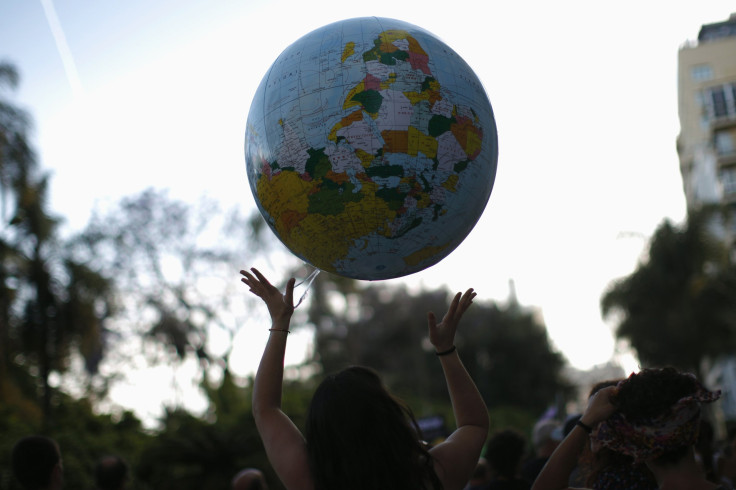Female Leaders Across The World: Hillary Clinton Says The Future Is Female, But US Still Trails Behind Other Nations

After Hillary Clinton’s loss to President Donald Trump, she remained optimistic for the future of female political leadership in the U.S. “We have still not shattered that highest and hardest glass ceiling, but someday, someone will,” she said after losing in November.
More recently, in a video that was made for the 2017 Makers Conference meant to celebrate the accomplishments of many female leaders in the past as well as the present, and encourage women to become “leaders of tomorrow,” Clinton said the historic Women’s March on Washington that took place Jan. 21, reassured her that “the future is female.”
“We need strong women to step up and speak out,” she continued. “We need you to dare greatly and lead boldly. So please, set an example for every woman and girl out there who’s worried about what the future holds and wonders whether our rights, opportunities and values will endure.”
Even if America has yet to have a female president after 240 years of men in the job, other countries look very different.
Fifty-nine countries around the globe have had a female head of government, according to CNN.
Sri Lanka was the first country in the world to elect a female head of government, in July 1960. Indira Gandhi became the first woman prime minister of India in 1966, and three years later Golda Meir became Israel’s first female head of government. Elisabeth Domitien followed suit, appointed the first female prime minister of the Central African Republic in 1975 -- over 40 years ago.
Below is a list of female leaders across the world sorted by the date each country elected or appointed its first female president or prime minister:
1960s:
Sri Lanka, Sirimavo Bandaranaike, 1960
India, Indira Gandhi, 1966
Israel, Golda Meir, 1969
1970s:
Argentina, Isabel Perón, 1974
Central African Republic, Elisabeth Domitien, 1975
Portugal, Maria de Lourdes Pintasilgo, 1979
United Kingdom, Margaret Thatcher, 1979
1980s:
Dominica, Eugenia Charles, 1980
Iceland, Vigdís Finnbogadóttir, 1980
Norway, Gro Harlem Brundtland, 1981
Malta, Agatha Barbara, 1982
Philippines, Corazon Aquino, 1986
Pakistan, Benazir Bhutto, 1988
1990s:
Ireland, Mary Robinson, 1990
Lithuania, Kazimira Danutė Prunskienė, 1990
Nicaragua, Violeta Barrios Torres de Chamorro, 1990
Bangladesh, Khaleda Zia, 1991
France, Édith Cresson, 1991
Poland, Hanna Suchocka, 1992
Burundi, Sylvie Kinigi, 1993
Canada, Kim Campbell, 1993
Rwanda, Agathe Uwilingiyimana, 1993
Turkey, Tansu Çiller, 1993
Haiti, Claudette Werleigh, 1995
Guyana, Janet Rosenberg, 1997
New Zealand, Jenny Shipley, 1997
Latvia, Vaira Vīķe-Freiberga, 1999
Panama, Mireya Elisa Moscoso Rodríguez, 1999
Switzerland, Ruth Dreifuss, 1999
2000s:
Finland, Tarja Halonen, 2001
Indonesia, Megawati Sukarnoputri, 2001
Senegal, Mame Madior Boye, 2001
São Tomé and Príncipe, Maria das Neves, 2002
Peru, Beatriz Merino, 2003
Macedonia, Radmila Šekerinska, 2004
Mozambique, Luísa Diogo, 2004
Germany, Angela Merkel, 2005
Ukraine, Yulia Tymoshenko, 2005
Chile, Michelle Bachelet, 2006
Jamaica, Portia Simpson-Miller, 2006
Liberia, Ellen Johnson Sirleaf, 2006
South Korea, Han Myung-sook, 2006
Moldova, Zinaida Greceanîi, 2008
Croatia, Jadranka Kosor, 2009
2010s:
Australia, Julia Gillard, 2010
Costa Rica, Laura Chinchilla, 2010
Kyrgyzstan, Roza Otunbayeva, 2010
Slovakia, Iveta Radičová, 2010
Trinidad and Tobago, Kamla Persad-Bissessar, 2010
Denmark, Helle Thorning-Schmidt, 2011
Kosovo, Atifete Jahjaga, 2011
Mali, Cissé Mariam Kaïdama Sidibé, 2011
Thailand, Yingluck Shinawatra, 2011
Malawi, Joyce Banda, 2012
Slovenia, Alenka Bratušek, 2013
Turkish Republic of Northern Cyprus, Sibel Siber, 2013
Brazil, Dilma Rousseff, 2014
Mauritius, Ameenah Firdaus Gurib-Fakim, 2015
Namibia, Saara Kuugongelwa-Amadhila, 2015
© Copyright IBTimes 2024. All rights reserved.





















